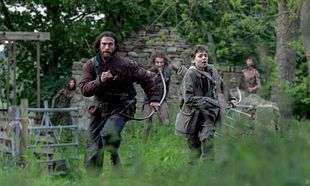A period drama that celebrates poetry might not be a 'must see' for everyone, but those willing will find so much to enjoy in Bright Star's performances and belief in pure love.
"If poetry can not come as naturally as leaves to a tree, it better not come at all." Doomed relationships - period dramas lap them up, don't they? Bright Star is a peek into the love affair of Fanny Brawne and poet John Keats, who died of tuberculosis at 25. Hampstead Village, London, 1818, and the feisty Fanny (Cornish) is an avid follower of fashion (we first see her meticulously stitching a new hem to her dress) and cares nothing for poetry or literature. That all changes when she meets John Keats (Whishaw), a struggling poet whose latest work has received damning reviews in the press. Although Fanny didn't like Keats's book, she thought the opening line - A thing of beauty is a joy forever: its loveliness increases; it will never
pass into nothingness - was "perfect". Keats lives next door to Brawne, a lodger of fellow poet and friend Charles Armitage Brown (Schneider), and love grows between the pair. Keats, however, is too poor to ask for Fanny's hand in marriage, and Charles, seeing Fanny as a distraction, does everything he can to drive a wedge between the two. Then, just as it seems everything is falling into place, Keats takes off for London without his coat…
The power of Bright Star is in its restraint and subtlety. Keats and Brawne never consummated their relationship before he died of tuberculosis at the age of 25, and Campion (The Piano) doesn't give in to the temptation of 'sexing up' her film; the doomed lovers are limited to clandestine kisses, secret brushes of skin and a million furtive glances. Campion is celebrating pure love. This self-control spills over into the dialogue, with Campion enjoying the silences as much as the verbal sparring that dot the film. The director is not only restrained in the writing, she's also restrained visually. Bright Star is a dull film to look at times, but this is a deliberate move as Campion holds everything back until she unleashes colour and life with a beautifully shot scene in a field of bluebells, and when Fanny lets loose captured butterflies in her bedroom. If restraint and subtlety is Bright Star's power, it can also be accused of being a little undemonstrative. Some scenes feel unfinished with Campion moving on before she gives away too much - at one point Keats puts a ring on Fanny's finger but Campion cuts away before we can see her reaction. It's a ploy that cheats the audience out of an emotional peak they've paid to see. Her denouement, too, lacks punch with the film petering out, instead of ending on a high/low.
The performances are perfect: Whishaw and Cornish display some serious chemistry, but every time Schneider is on screen he runs away with the film. It helps that he's playing a loud and boisterous character that belittles Fanny's spiritedness; bar their opening scene, she retreats into herself whenever he's in the room. It's a shame - these two characters have wicked tongues and there was scope for some verbal ding-dongs.








































































